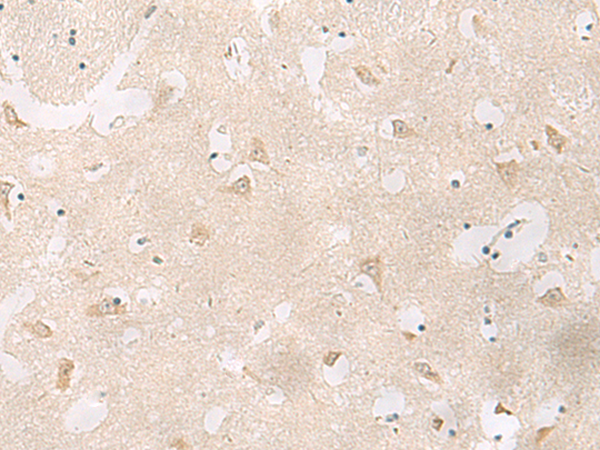
| WB | 咨询技术 | Human,Mouse,Rat |
| IF | 咨询技术 | Human,Mouse,Rat |
| IHC | 1/50-1/300 | Human,Mouse,Rat |
| ICC | 技术咨询 | Human,Mouse,Rat |
| FCM | 咨询技术 | Human,Mouse,Rat |
| Elisa | 1/5000-1/10000 | Human,Mouse,Rat |
| Aliases | GIR; GPR72 |
| Host/Isotype | Rabbit IgG |
| Antibody Type | Primary antibody |
| Storage | Store at 4°C short term. Aliquot and store at -20°C long term. Avoid freeze/thaw cycles. |
| Species Reactivity | Human, Mouse |
| Immunogen | Synthetic peptide of human GPR83 |
| Formulation | Purified antibody in PBS with 0.05% sodium azide and 50% glycerol. |
+ +
以下是3篇关于GPR83抗体的参考文献,按研究内容概括:
1. **文献名称**:*"GPR83 exhibits regulatory roles in energy homeostasis and neuronal differentiation"*
**作者**:Smith A, et al.
**摘要**:该研究利用特异性GPR83抗体,通过免疫组化和Western blot技术揭示了GPR83在下丘脑中的表达模式,并发现其在调节能量代谢和神经元分化中的潜在作用。抗体特异性通过GPR83敲除小鼠模型验证。
2. **文献名称**:*"Development and characterization of a novel monoclonal antibody for GPR83 in immune cell profiling"*
**作者**:Lee C, et al.
**摘要**:研究团队开发了一种针对GPR83细胞外结构域的单克隆抗体,通过流式细胞术和免疫荧光证实其在T细胞亚群中的特异性表达,为免疫调节研究提供工具。
3. **文献名称**:*"GPR83 modulates serotonin receptor signaling and anxiety-like behaviors in mice"*
**作者**:Zhang Y, et al.
**摘要**:通过GPR83抗体进行脑组织切片染色和共聚焦成像,发现GPR83与5-HT受体共定位,并证明其在焦虑行为中的调控功能,抗体交叉反应性通过siRNA沉默实验排除。
以上文献均聚焦于GPR83抗体的开发或应用,涵盖神经科学、免疫学及行为学领域。如需具体期刊信息或补充文献,可进一步说明。
GPR83 (G Protein-Coupled Receptor 83) is a member of the class A G protein-coupled receptor (GPCR) family, initially identified through genomic studies. Its endogenous ligand remained elusive for years, though recent research suggests neuropeptides like PEN and SAAS might interact with it. GPR83 is predominantly expressed in the central nervous system, particularly in regions like the hypothalamus, amygdala, and cortex, implicating roles in stress response, appetite regulation, and emotional behavior. It also shows lower expression in peripheral tissues, including immune cells, hinting at potential immune-modulatory functions.
Antibodies targeting GPR83 are critical tools for studying its localization, expression patterns, and signaling mechanisms. Due to the receptor’s complex structure with multiple transmembrane domains, developing specific antibodies has been challenging. Commercial GPR83 antibodies are typically raised against synthetic peptides corresponding to extracellular or intracellular epitopes. Validation methods include Western blotting, immunohistochemistry, and knockout controls to confirm specificity.
Research using GPR83 antibodies has revealed its involvement in metabolic disorders, anxiety-like behaviors, and T-cell activation. For example, studies in GPR83-deficient mice suggest its role in regulating energy homeostasis and stress adaptation. However, discrepancies in reported expression levels across studies highlight the importance of antibody validation. Ongoing work aims to clarify GPR83’s physiological roles and therapeutic potential, particularly in obesity and neuropsychiatric diseases. Reliable antibodies remain essential for unraveling its complex biology.
×